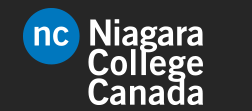About Electrical Engineering Technician in Niagara College
Do you have an interest in developing advanced electrical and electronic equipment to help power new systems?
As an Electrical Engineering Technician graduate you will work closely with engineers on the design and development of the innovative technology used for communications, power systems, computers and monitoring systems in a wide variety of fields.
Highlights
-
Gain a solid understanding of electrical power systems, machines and programmable logic controllers (PLCs) and benefit from learning about new trends in electrical motor controls, power electronics and renewable energy.
-
Receive practical, hands-on experience in state-of-the-art labs.
-
Graduates with relevant experience can apply for the Ontario Association of Certified Engineering Technicians and Technologists (OACETT) certification.
-
Further your studies by transitioning into Niagara College's Electrical Engineering Technology (Co-op) program.
Career Opportunities
- Electrical contractor
- Electrical equipment manufacturer
- Electrical supplier
- Lab technician
- Maintenance supervisor
- Quality control supervisor
- Technical specialist
Academic qualification equivalents
English language requirements (one of the below):
- IELTS : 6 (No Individual band under 5.5)
- TOEFL : 79 with 20 in Writing and 20 in Speaking
- PTE : 53-57
Niagara college Highlights
| Type of College |
Public |
| Establishment Year |
1967 |
| Type of Campus |
Urban |
| Housing |
Available |
| Number of Programs |
130+ |
| Number of Campuses |
2 |
| Full-time Students |
12,000+ |
| International Students |
4,700+ |
| Intake Seasons |
Fall, Winter, Spring |
Niagara College Average Tuition Fees And Other Expenses
The cost of attendance includes tuition fees, accommodation costs, and other expenses. The tables mentioned below will help international students estimate their cost of living in Canada.
Niagara College Tuition Fee
| Program |
Tuition Fee(per year) |
| Diploma/Certificate |
13,350-14,550 CAD |
| Undergraduate Degree |
14,550 CAD |
| Graduate |
16,550 CAD |
The cost of attendance is different for international students studying at Niagara College than the domestic students.
Accommodation
NC provides many housing facilities to their students on both their campuses. Students can also consider renting rooms, houses or sublets along with other students who are looking for housemates.
| Category |
Expense (per year) |
| Double Occupancy Suite |
7,400 CAD |
| Quad Occupancy Suite |
3,840 CAD |
| Homestay |
9,000 CAD |
International students also have the following options for stay while they study in Canada:
- Homestays- International students can reside with a Canadian family once they have received confirmation from them.
- Landing Pad- Niagara College Landing Pad accommodates International students for 30 days, including two meals per day.
The college helps the new students with information and ease the adjustment process with the new country.
Other Expenses
| Service Fee |
632 CAD per term |
| Medical Insurance |
70 CAD per month |
| Bus fee |
192.50 CAD per term |
| Books and Supplies |
2,500 CAD |
| Personal and Miscellaneous Expenses |
2,000-8,000 CAD |
A 500 CAD tuition deposit is required of all incoming and renewing students. A spot in the programme must be secured with this deposit. This charge is a component of the tuition fee, lowering the overall amount of tuition due.
Niagara College Admissions Application
Candidates that qualify for early admission are given preference (subject to programme capacity). Those who don't meet the requirements for early admission may still be eligible for admission through the competitive admissions process. The basic requirements, however, do not ensure admittance.
| Where to Apply |
Online Application Portal |
| Application Fee |
100 CAD |
| Application Deadlines for International Students(Recommended) |
Spring 2020: October 30, 2020; Fall 2020: February 1, 2020; Winter 2021: June 8, 2020 |
| Documents Required |
Transcripts, LOR, SOP |
| English Language Requirement |
IELTS: Overall 6.5(no band under 5.5)
TOEFL PBT: 550
TOEFL iBT: 79 - 80(minimum 22 in writing and speaking) |
